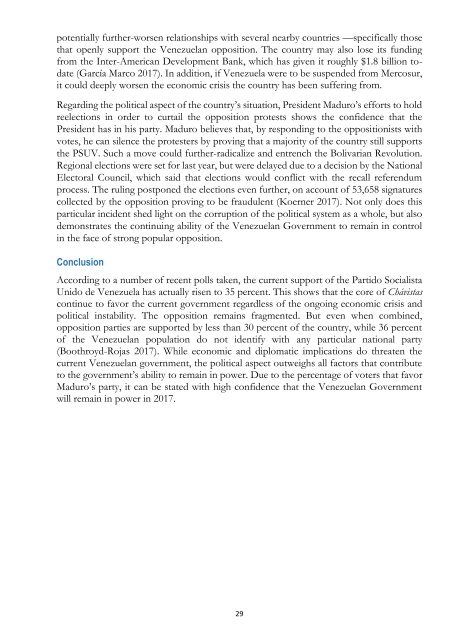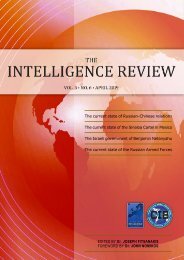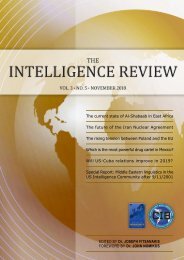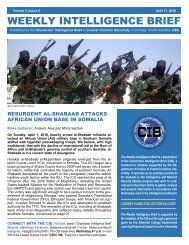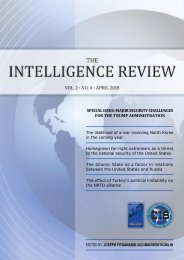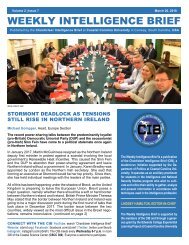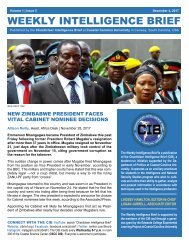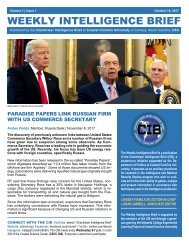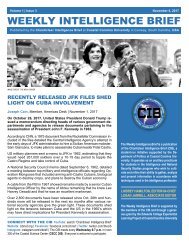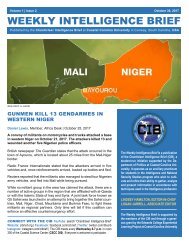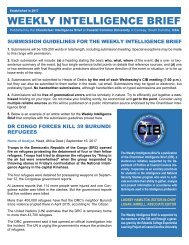The Intelligence Review | volume 2 | issue 3 |
This volume is the product of a collaboration between the European Intelligence Academy (EIA) and the Chanticleer Intelligence Brief (CIB), a student-run initiative supported by the Department of Politics at Coastal Carolina University in Conway, South Carolina, United States. Eight CIB analysts tackle some of the most pressing and timely questions confronting intelligence observers today. Topics in this volume include the current and projected strength of the Islamic State in Libya, the status of unification efforts on the island of Cyprus, the future of the government in Venezuela, and the United States’ place in the Paris climate agreement. There are also papers examining the construction of energy pipelines in Central Asia, as well as aspects of Iranian geopolitics in relation to the United States. Last, though certainly not least, we have included an estimative intelligence analysis of the first round of this year’s presidential elections in France. It refers to an event of global significance that has already taken place. However, it is included in this volume as an illustration of the power of intellectual accuracy and the ability of an intelligence analyst to achieve 100 percent accuracy —as this analyst does— by methodically considering and evaluating the analytical parameters of her question with the right balance of precision and intuition.
This volume is the product of a collaboration between the European Intelligence Academy (EIA) and the Chanticleer Intelligence Brief (CIB), a student-run initiative supported by the Department of Politics at Coastal Carolina University in Conway, South Carolina, United States. Eight CIB analysts tackle some of the most pressing and timely questions confronting intelligence observers today.
Topics in this volume include the current and projected strength of the Islamic State in Libya, the status of unification efforts on the island of Cyprus, the future of the government in Venezuela, and the United States’ place in the Paris climate agreement. There are also papers examining the construction of energy pipelines in Central Asia, as well as aspects of Iranian geopolitics in relation to the United States. Last, though certainly not least, we have included an estimative intelligence analysis of the first round of this year’s presidential elections in France. It refers to an event of global significance that has already taken place. However, it is included in this volume as an illustration of the power of intellectual accuracy and the ability of an intelligence analyst to achieve 100 percent accuracy —as this analyst does— by methodically considering and evaluating the analytical parameters of her question with the right balance of precision and intuition.
Create successful ePaper yourself
Turn your PDF publications into a flip-book with our unique Google optimized e-Paper software.
potentially further-worsen relationships with several nearby countries —specifically those<br />
that openly support the Venezuelan opposition. <strong>The</strong> country may also lose its funding<br />
from the Inter-American Development Bank, which has given it roughly $1.8 billion todate<br />
(García Marco 2017). In addition, if Venezuela were to be suspended from Mercosur,<br />
it could deeply worsen the economic crisis the country has been suffering from.<br />
Regarding the political aspect of the country’s situation, President Maduro’s efforts to hold<br />
reelections in order to curtail the opposition protests shows the confidence that the<br />
President has in his party. Maduro believes that, by responding to the oppositionists with<br />
votes, he can silence the protesters by proving that a majority of the country still supports<br />
the PSUV. Such a move could further-radicalize and entrench the Bolivarian Revolution.<br />
Regional elections were set for last year, but were delayed due to a decision by the National<br />
Electoral Council, which said that elections would conflict with the recall referendum<br />
process. <strong>The</strong> ruling postponed the elections even further, on account of 53,658 signatures<br />
collected by the opposition proving to be fraudulent (Koerner 2017). Not only does this<br />
particular incident shed light on the corruption of the political system as a whole, but also<br />
demonstrates the continuing ability of the Venezuelan Government to remain in control<br />
in the face of strong popular opposition.<br />
Conclusion<br />
According to a number of recent polls taken, the current support of the Partido Socialista<br />
Unido de Venezuela has actually risen to 35 percent. This shows that the core of Chávistas<br />
continue to favor the current government regardless of the ongoing economic crisis and<br />
political instability. <strong>The</strong> opposition remains fragmented. But even when combined,<br />
opposition parties are supported by less than 30 percent of the country, while 36 percent<br />
of the Venezuelan population do not identify with any particular national party<br />
(Boothroyd-Rojas 2017). While economic and diplomatic implications do threaten the<br />
current Venezuelan government, the political aspect outweighs all factors that contribute<br />
to the government’s ability to remain in power. Due to the percentage of voters that favor<br />
Maduro’s party, it can be stated with high confidence that the Venezuelan Government<br />
will remain in power in 2017.<br />
29


